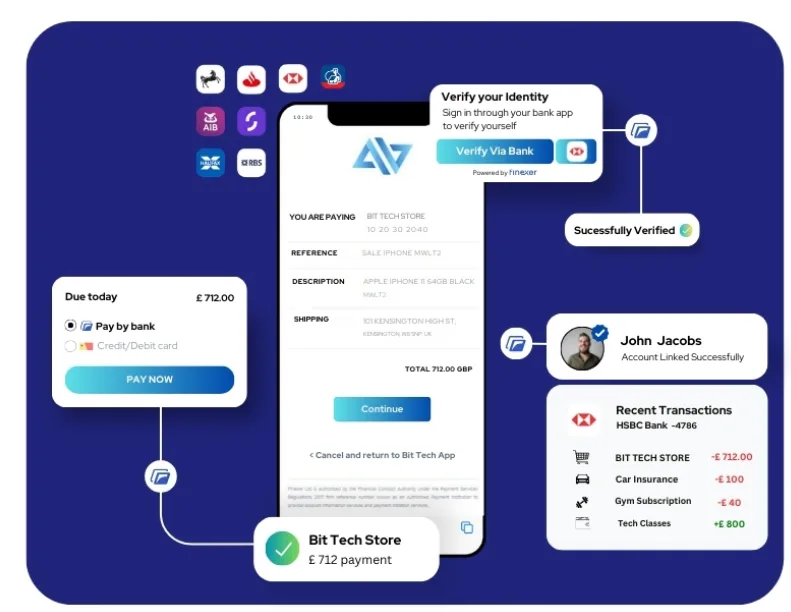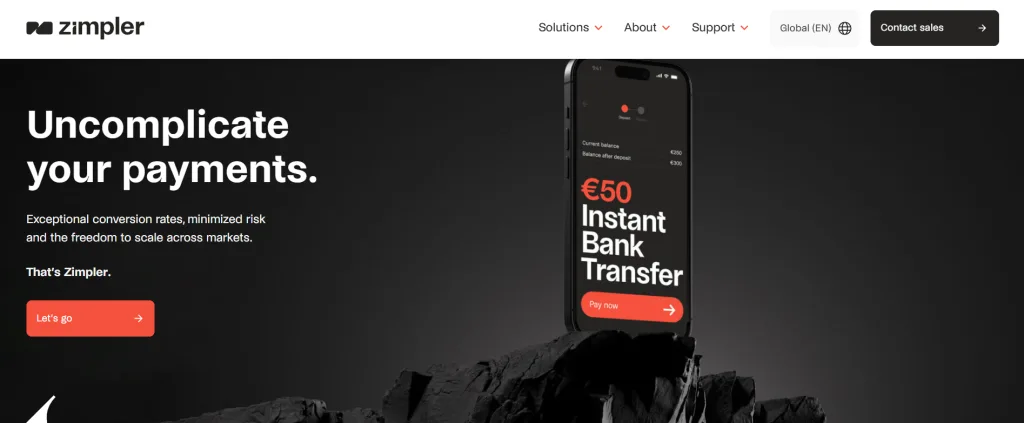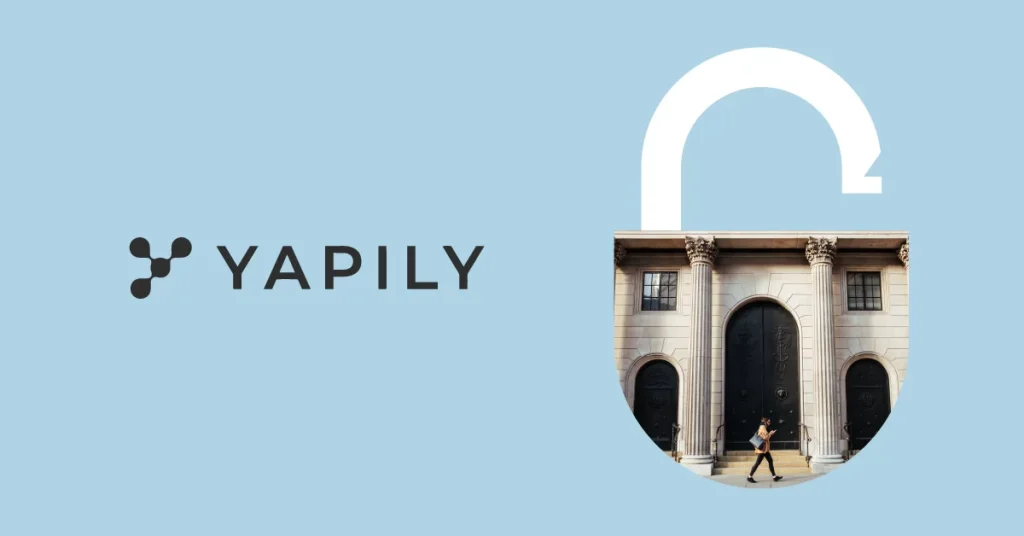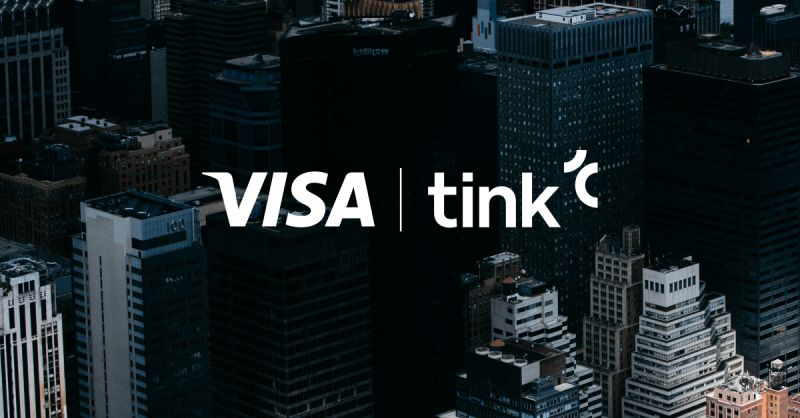Open banking software enables businesses to securely connect with banks through APIs, allowing direct access to customer-approved financial information. It simplifies how businesses handle payments, data sharing, and identity verification.
Companies use open banking software primarily for:
- Instant bank payments – quicker and less costly than card payments.
- Open banking data – real-time access to customer transaction details for accurate verification and financial insights.
- Single integration – connects businesses with multiple banks through one platform.
For example, a UK-based online retailer can implement open banking software to offer direct bank payments at checkout, significantly reducing transaction fees. Additionally, the same retailer can access open banking data to quickly verify customer identities and analyse spending habits.
Overall, open banking software gives UK businesses an efficient method to manage financial transactions and customer data without complex integrations.
Why Open Banking Software Matters for UK Businesses
Businesses in the UK are adopting open banking software to improve payment processing and financial data access. It eliminates the need for manual bank integrations, reducing costs and improving transaction speed.
Key Benefits of Open Banking Software:
- Instant Payments – Direct bank transfers reduce delays and lower transaction fees compared to card payments.
- Open Banking Data – Secure access to transaction details helps with identity verification and fraud detection.
- Reduced Payment Failures – Transactions rely on bank authentication, minimising declined payments.
- Simplified Compliance – Open banking software ensures transactions meet regulatory standards without extra manual work.
For example, a UK-based subscription service can use open banking software to collect recurring payments directly from customer bank accounts, avoiding card expiration issues. Similarly, a lending company can verify applicant income in real time using open banking data, reducing processing time.
Businesses looking for a secure and efficient way to handle transactions and customer verification benefit from integrating open banking software into their operations.
1. Finexer

- Headquarters: London,UK
- Bank Coverage: 99% of UK banks
- Key Features: Real-time financial data, direct bank payments, automated reconciliation, white-label platform
- Best For: Accounting firms, SMBs, fintech startups, businesses using ERP systems,Regtech
Overview
Finexer is designed for businesses looking for a scalable, efficient, and compliant open banking solution. It allows accountants, finance teams, and fintech startups to automate financial operations, reducing manual processes and transaction costs. The platform connects directly with UK banks, providing real-time bank data for seamless financial management.
Why Choose Finexer?
✅ Single-App Simplicity – Manage all financial operations from one easy-to-use platform. No complex integrations required.
✅ Real-Time Financial Data – Ensures instant reconciliation, eliminating manual bookkeeping errors.
✅ Lower Transaction Costs – Direct bank-to-bank payments reduce fees by up to 90%.
✅ Bulk Payments & Payroll Management – Automates high-volume transactions, making it ideal for payroll and supplier payments.
✅ Faster Deployment – Connects with UK banks 3x faster than competitors.
✅ Startups-First Pricing – Transparent, pay-as-you-grow pricing without enterprise-level commitments.
✅ Integration with Third-Party Platforms – Works with tools like Xero, QuickBooks, and Sage.
Success Story: How Finexer Transformed Accounting for a B2B SaaS Provider

A leading business process automation provider, Sysynkt, needed an open banking software that could seamlessly integrate with accounting systems. Many solutions in the market focused on consumer services, overlooking the unique needs of business clients.
Challenges Sysynkt Faced Before Finexer:
- Limited business-focused open banking providers
- High transaction costs affecting profitability
- Complex integrations with existing accounting software
How Finexer Solved These Issues:
✅ Tailored business banking solutions – Designed specifically for businesses rather than generic consumer offerings.
✅ Lower operational costs – Reduced transaction fees, making high-volume transactions more cost-effective.
✅ Seamless ERP integration – Enabled instant reconciliation and automated financial operations, saving time for finance teams.
✅ Flexible & Collaborative Approach – Worked closely with Sysynkt to ensure smooth deployment without disruption.
“Finexer’s willingness to work closely with us, rather than treating us as just another customer, was truly refreshing.”
– Penny Phillips, Chief Commercial Officer, Sysynkt
Since adopting Finexer, Sysynkt has successfully automated financial operations for some of the largest companies globally, streamlining cash flow management and enhancing financial transparency.
Finexer is the ideal choice for accountants, ERP systems, and businesses seeking a reliable, cost-effective, and scalable open banking solution.
Get Started
Start your 14-day free trial today and see why businesses trust Finexer for secure, compliant, and tailored open banking solutions.
Zimpler

- Headquarters: Stockholm, Sweden
- Bank Coverage: 350+ banks across the Nordics, UK, and EU
- Key Features: Account-to-account (A2A) payments, instant payouts, checkout integrations
- Best For: E-commerce, iGaming, and fintechs seeking real-time payment experiences
Overview
Zimpler is a real-time payments platform that facilitates instant account-to-account transactions using open banking. While it initially focused on Sweden, Zimpler has expanded its reach across Europe and the UK, offering fast, secure payments directly from consumer bank accounts.
Unlike data-focused open banking providers, Zimpler is built specifically for consumer payments, helping merchants, platforms, and service providers move money without cards or intermediaries. Its merchant tools include refund management, smart routing, and identity verification built into the payment flow.
Zimpler is regulated and licensed across the EU and operates with strong compliance controls, making it a preferred solution for high-risk verticals like iGaming, trading, and crypto that need instant payout capabilities and end-user verification.
Key Features:
✅ A2A Payments – Enables direct, real-time payments from user bank accounts.
✅ Instant Payouts – Supports fast disbursements for withdrawals, refunds, and gaming wins.
✅ Embedded Checkout – Provides branded checkout flows optimised for user conversion.
Zimpler is used by businesses that need fast, frictionless payments at scale, especially in sectors where real-time processing and compliance are non-negotiable.
3. Yapily

- Headquarters: London, UK
- Bank Coverage: 2,000+ banks across Europe and the UK
- Key Features: API-based payment initiation, financial data access
- Best For: Businesses requiring direct API connections for payments and data retrieval
Overview
Yapily is an API-first open banking provider that enables businesses to access financial data and initiate payments directly through banking networks. Unlike platforms that offer ready-made interfaces, Yapily provides a developer-centric solution, giving businesses greater control over their open banking implementation.
By connecting directly to banks, Yapily allows businesses to retrieve account data, verify transactions, and initiate payments without relying on traditional payment processors. This makes it suitable for companies that require custom-built financial solutions.
Key Features:
✅ Payment Initiation – Supports direct bank-to-bank payments via open banking APIs.
✅ Financial Data Access – Enables businesses to retrieve customer transaction history and account details.
✅ Custom API Connectivity – Designed for businesses that require deeper technical integration.
Yapily is used by companies that want flexibility and control over their open banking setup, providing a technical foundation for payment and data-driven applications.
4. Tink

- Headquarters: Stockholm, Sweden
- Bank Coverage: 3,400+ banks across Europe, including strong UK presence
- Key Features: Payment initiation, account aggregation, financial data insights
- Best For: Businesses looking to access banking data and enable account-to-account payments
Overview
Tink provides open banking connectivity for businesses that need access to financial data and account-to-account payments. It enables companies to retrieve bank account details, verify transactions, and process payments directly from customer accounts.
With a focus on data aggregation, Tink allows businesses to collect and analyse customer financial information from multiple sources. This can be used to provide insights into spending patterns, creditworthiness, and financial management.
Key Features:
✅ Payment Initiation – Enables businesses to process account-to-account transactions securely.
✅ Data Aggregation – Connects to multiple banks, consolidating financial information in one place.
✅ Transaction Verification – Helps businesses validate payment details before processing.
Tink is a widely used open banking software for businesses that require both financial data access and payment processing within a single API-driven solution.
5. Plaid

- Headquarters: San Francisco, USA
- Bank Coverage: 2,000+ European banks, including UK institutions
- Key Features: Secure bank authentication, transaction categorisation, multi-bank connectivity
- Best For: Businesses that require reliable financial data access for user verification and risk assessment
Overview
Plaid provides open banking software that enables businesses to connect with customer bank accounts to verify account ownership, retrieve financial data, and facilitate transactions. The platform is widely used for user authentication and financial insights, making it suitable for companies that require secure access to banking information.
Plaid’s API allows businesses to retrieve transaction history, assess financial patterns, and categorise spending, helping them make informed decisions. Its ability to link with multiple financial institutions ensures that companies can access a broad network of banking data through a single platform.
Key Features:
✅ Bank Authentication – Helps businesses securely verify customer bank account details before transactions.
✅ Transaction Categorisation – Sorts financial data into categories, enabling better analysis of spending patterns.
✅ Multi-Bank Connectivity – Connects with numerous financial institutions, allowing businesses to access a wide range of banking data.
Plaid is a widely used open banking software for businesses needing secure, structured access to customer financial data, ensuring reliable verification and transaction processing.
Comparing Top 5 Providers
| Provider | Headquarters | Coverage | Key Features | Industries |
|---|---|---|---|---|
| Finexer | London, UK | 99% of UK banks | Real-time payments, data aggregation, customer verification, white-label API | Accounting & ERP, Fintech, Startups |
| Plaid | San Francisco, USA | US, Canada, UK, and 15 European countries | Account verification, transaction data access, payment initiation | Fintech, Lending, Personal Finance |
| Tink | Stockholm, Sweden | 18 European countries | Personal finance management, account aggregation, payment initiation | Wealth Management, Digital Banking, Retail |
| Yapily | London, UK | 19 European countries | API-based data access, payment initiation, bulk payments | Enterprise Payments, Financial Services |
| Zimpler | Stockholm, Sweden | 350+ banks across Nordics, UK, and EU | Instant A2A payments, cross-border payouts, embedded checkout, KYC | iGaming, Fintech Lending, Marketplaces |
How to Choose the Best Open Banking Software?
Selecting the right open banking software depends on several factors, including the type of payments a business handles, the level of financial data access required, and integration capabilities. Businesses should assess their needs carefully to ensure they choose a provider that aligns with their operational goals.
Key Factors to Consider When Choosing Open Banking Software
1. Payment Capabilities
Different open banking software solutions offer varying payment methods, such as Direct Debit, Faster Payments, and account-to-account transfers. Businesses handling recurring transactions may prefer providers with automated payment collection, while those requiring instant bank transfers should look for real-time processing capabilities.
2. Financial Data Access
For businesses that need to verify customer transactions, assess creditworthiness, or streamline reconciliation, selecting a provider with comprehensive financial data access is essential. Some platforms focus on transaction categorisation and analytics, while others prioritise real-time balance checks and historical data retrieval.
3. Security & Compliance
As open banking software deals with sensitive financial information, security is a major consideration. Look for solutions that offer:
✅ Strong data encryption
✅ Multi-factor authentication
✅ Compliance with UK financial regulations, including FCA authorisation
4. Scalability & Integration
Businesses planning to expand should choose a provider that can handle increasing transaction volumes without requiring constant upgrades. Some platforms support modular scaling, allowing companies to start with basic features and add more functionality over time.
5. Pricing Structure
Understanding the pricing model is essential, as costs can vary based on transaction volume, API calls, and additional services. Some providers charge per transaction, while others offer tiered pricing based on usage.
What is open banking, and how does it benefit businesses?
Open banking allows third-party providers to access financial data through secure APIs, enabling businesses to offer enhanced financial services, streamline payments, and improve customer experiences.
How secure is open banking, and what measures protect my financial data?
Open banking operates under strict regulatory frameworks like PSD2, requiring strong customer authentication and data encryption to ensure the security and privacy of financial information.
Can open banking software integrate with existing accounting systems?
Yes, many open banking solutions offer seamless integration with popular accounting and ERP systems, facilitating real-time financial data synchronisation and improved financial management.
What are the cost implications of implementing open banking software for a small business?
Costs vary depending on the provider and the features required. Some offer scalable pricing models suitable for small businesses, while others may have higher fees associated with advanced functionalities.
What impact does open banking have on traditional banking relationships?
Open banking fosters collaboration between traditional banks and fintech companies, leading to more innovative financial products and services, though it may also increase competition.
What is the Most Affordable Open Banking Software in the UK?
Businesses looking for a budget-friendly open banking provider in the UK can explore Finexer for a low-cost, high-efficiency financial management solution.

Try Finexer for better savings in 2025 ! Schedule your free demo and get a 14 days Trial by Finexer 🙂
